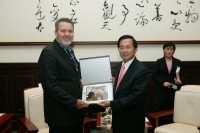News & activities
 News releases
News releases

President Chen Shui-bian receives Mr. Christopher Warren, president of the "International Federation of Journalists" this afternoon. The president sincerely expressed his welcome to the leader of this press organization for coming to Taiwan to host the Asian conference organized in Taipei.
The president said that it has been Mr. Warren's third term as the president of the International Federation of Journalists since he became the head of it in 1998, and the Association of Taiwan Journalist was approved as one of the federation's official organizations during Warren's first term. When Taiwanese journalists encountered difficulties and unfair treatment covering the World Health Assembly and the United Nations, Warren spoke for Taiwan at many of these occasions. The president especially expressed his respect and gratitude for such an act.
Regarding the International Federation of Journalists holding its Asian conference in Taipei and enabling the Association of Taiwan Journalist to host the event, the president recognized it as an attestation of the performance of the Taiwanese reporters as well as the federation's high expectancy of the government which he feels duty-bound.
Although the U.S. "Freedom House" has rated Taiwan the 44th in the world where freedom of press is protected, a ranking that is six grades better than the preceding year and is considered one of the countries that enjoy freedom of the press, the president still thinks Taiwan has lots of room for improvement. And China, which is rated 177th this year, has dropped by four grades compared to the previous year, and is among the countries where the press doesn't have any freedom, and is considered by all the journalists in the world as a huge prison. Besides that, journalists in Nepal and Thailand who have published articles criticizing the governments were also imprisoned or dismissed. The president also expressed concern over this issue.
The president said that he could be considered as a semi-journalist because when he started to get involved in politics, he ran a magazine criticizing the government. He was sentenced to eight months in prison for doing that. Because of this experience, he deeply understands that it is very difficult to protect the freedom of press, as its price is often very great.
On the other hand, some people have criticized that the press in Taiwan enjoys too much freedom. But following 38 years of martial law, protecting freedom of press and freedom of speech has become very important. Therefore, the president thinks that the job in protecting press freedom should rather be excessive than to be deficient. If there should be confrontation between freedom of press and national security, the president would choose to sacrifice national security to protect the freedom of press. Though some people could not accept this insistence, the president still stands firm in this belief.
The president further indicates that the press is the greatest contributor to the promotion of democracy and freedom in Taiwan, especially after Taiwan had undergone a long period of martial law and was on the way from autocracy to democracy. Without the press' endeavors, visions and push, Taiwan's democracy could have never reached such a success.
The press is not only the best mirror for the politicians, but also the best preservative for the government. Regarding inaccurate reports on any issue, although the person involved would not accept it as the truth, he could still respect the journalist. If there is a chance to rectify it, then rectification should be made. If no, so be it. Under the leadership of Christopher Warren, the International Federation of Journalists has been aggressive in promoting public media going privatized and independent. This call matches with the Taiwan government's advocacy that political parties, government agencies and the military should withdraw from the media.
The president emphasized that the second phase constitutional reform is expected to include the full protection of the press' freedom. About the two public television stations, one will be totally operated by the government and the other to go privatization.
IFJ President Warren was greatly impressed by the democracy and freedom of the press that Taiwan has undergone. He also showed his admiration for the fruits of the success.
He said that not only Taiwan, but also the whole world cares about the freedom of press. The achievements in this domain represent Taiwan's success, and organizing the Asian conference of the International Federation of Journalists in Taipei is a symbol of this achievement.


